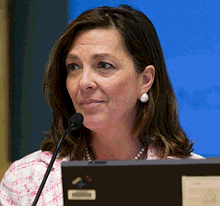
Typical street scene in Santa Ana, El Salvador. (Photo: iStock)
IMF Survey: Pilot Project Aims to Fill Data Void
June 26, 2007
- Traditional focus on soundness of individual banks needed to be expanded
- Few data available to enable national authorities to widen supervision
- Effort made to measure strengths, weaknesses of banking system
In the aftermath of the financial crises of the late 1990s in Asia, Latin America, and Russia, it became clear that the traditional supervisory focus on the soundness of individual banks needed to be expanded.

Roadside money changer in Jakarta, Indonesia—where authorities cite constraints on collecting nonbank financial entity data (photo: Jewel Samad/AFP)
Financial Soundness Exercise
The wider focus should include the health of a nation's entire financial system and the global system as well. But there was a paucity of data available to enable authorities to do that. "Even when such data were available, it was unclear what their compilation methodology was, and whether they were optimally constructed for identifying the vulnerabilities of the entire financial sector.
Few countries made such data available to markets, and cross-country comparability was unfathomable," Rob Edwards, Director of the IMF's Statistics Department, last month told a conference of countries that have joined with the IMF in a pilot project to begin to fill that void.
Assessing the effort
The conference at the IMF on May 30-31 was held to assess a nearly seven-year effort to construct a framework for, compile, and publish a set of standardized statistics, now called the financial soundness indicators (FSIs), to measure the current strengths and weaknesses of a country's banking system and to allow analysts and authorities to compare it with banking systems in other countries.
The effort first had to settle on what data to collect—and ended up creating a framework that drew on commercial accounting, supervisory, and macroeconomic statistics concepts. There are 12 core indicators that relate to the soundness of banking systems: they measure capital adequacy, asset quality, earnings and profitability, liquidity, and sensitivity to market risk.
"Encouraged" FSIs provide additional information on banks as well as nonbank financial institutions (such as pension funds and insurance companies), the nonfinancial economy (corporations and households), the real estate market, and the securities markets.
Coordinated compilation exercise
The question then became whether those FSIs could be produced in a useful and timely way. To find out, 62 countries participated over the past three years in that pilot effort—called the Coordinated Compilation Exercise (CCE)—to collect, compile, and publish financial soundness indicators for December 2005, using the Compilation Guide produced by the IMF.
Last January, countries began to post those end-2005 financial soundness indicators on the IMF website, www.imf.org. As of May 31, 57 of the 62 countries had done so.
Because of the inevitability that country data would not always be comparable—for legal, regulatory, collection, or cost reasons—countries are also required to produce metadata (information that describes the underlying data) to enable users to understand and account for differences in country statistics. For example, one nation's definition of nonperforming bank loans might differ from another's, and this difference has to be taken into consideration in cross-country or systemic analyses.
What was the verdict?
The conference participants concluded that the CCE was on the right track and that the effort should continue. Countries have invested heavily in developing and disseminating FSIs and, for the most part, the benefits have outweighed the costs, many delegates said.
"It would be a shame if it was stopped at this point," said Stefan Brunken of Germany's Bundesbank. "FSIs should become a standing body of international financial statistics," said Walid Alameddine, chair of Lebanon's Banking Control Commission, which produced all the core indicators and the encouraged banking indicators despite the turbulence in that country. In fact, during a 90-minute general discussion of the merits of the exercise and the underlying FSIs, not one delegate suggested the FSI project should be terminated.
There also seemed to be a widespread consensus that more countries should join the collection and dissemination process and that the IMF should remain at its center. The Fund "is a better place to look at peer groups," said Pat O'Connor of the Bank of England. It can assess the variations within and among the peer groups that provide early warning signals of banking system problems and systemic risks to global financial soundness.
Data collection, dissemination
But conflicts are often in the particulars, and there was far less unanimity when it came to many of the details of data collection and dissemination—issues that the IMF will deal with in the coming weeks as it prepares a report for the Fund's Executive Board, said Alfredo Leone, Deputy Director of the IMF's Statistics Department.
Those differences ranged from whether to increase the number of core and encouraged indicators, to the relative importance of producing statistics geared for international comparability versus statistics tailored to national circumstances, and how often the data should be collected and published. There were numerous technical critiques of individual indicators and methods of compilation.
On the question of adding to the list of FSIs, there was division among the delegates. Many said that the soundness of some important financial subsectors—such as insurance, pension funds, securities dealers, investment funds, and finance and leasing companies—was not being assessed properly by existing FSIs, making it difficult to draw an accurate picture of the financial system as a whole. But other delegates worried that even though there are gaps in the current list of FSIs, adding new ones at this point would be counterproductive because there is so much work to do on implementing existing indicators.
Hard to compile
For many countries, even compiling the already encouraged nonbank indicators has been difficult. For example, Nugroho Santoso of Bank Indonesia, in a formal presentation on his country's experience in the CCE, said that for the time being Indonesia compiles FSIs only for the banking (deposittaking) sector because of the lack of data for nonbank sources.
Several other countries—among them Brazil, India, and Turkey—also cited constraints on collecting nonbank data. There was also debate over the existing FSIs aimed at deposit-taking institutions, and several delegates called for careful consideration of the appropriate FSIs to include in the list, with a number of delegates making concrete proposals for new indicators.

Nugroho Santoso of Bank Indonesia recounted the difficulty of collecting nonbank data (photo: Eugene Salazar/IMF)
As for how often the data should be collected and published, a number of delegates were emphatic that it should be done quarterly, with no more than a three-month lag between collection and dissemination. Mustafa Yuksel, of Australia, said that less frequent collection would make the data "meaningless" for comparison and surveillance.
That position was echoed by Eddy Azoulay of the Bank of Israel, who said "the most important thing is comparability." Francis Selialia of the South African Reserve Bank said that it "seemed fair to submit on a quarterly basis." But several other countries said it would be difficult to gather some or all of the data more frequently than every six months.
Harmonizing with international standards
Despite their general enthusiasm for FSIs, though, some delegates warned that national authorities and colleagues in other collaborating agencies in their countries would have to be persuaded of the value of continuing to devote resources to the compilation of the data. Gabriel Jiménez Romero of the Comisión Nacional Bancaria y de Valores of Mexico pointed to the "complex web of supervisory functions" involved in the collection effort. Cornelio Farias Pimentel, of Banco Central do Brasil, said it is important that the effort get the support "of not just the central bank, but other authorities too."
Mariela Iturriaga of Banco Central de Chile said the IMF could also help ensure that countries continue to participate by requiring the use of FSIs in such Fund activities as the annual Article IV country surveillance reports. The IMF's Monetary and Capital Markets Department, which has collaborated with the Statistics Department on FSI development, has begun to use the indicators in its global financial surveillance efforts.

Christina Luna of Banco de España called for increased harmonization of financial soundness indicators (photo: Eugene Salazar/IMF)
The delegates also debated whether the methodology of compilation should be modified to conform even more closely to evolving international supervisory and accounting standards. Many country representatives said the methodology in the IMF's Compilation Guide should defer to those standards because of data availability issues, costs of data collection, and analytical considerations.
Cristina Luna of Banco de España, for example, said the FSI effort was started "at a time when accounting and solvency rules were changing." To make "FSIs comparable over time and across countries, we need to integrate the different tasks and techniques related to the areas of accounting, solvency, and financial accounts," she said.


